A Yoke of Gold
A Yoke of Gold is a 1916 American silent black and white melodrama directed by Lloyd B. Carleton and starring Dorothy Davenport and Emory Johnson. Based on an original story by Rob Wagner, it is a period piece set in the early days of the California missions. The movie was released on November 20, 1916 by Universal.[2][3]
| A Yoke of Gold | |
|---|---|
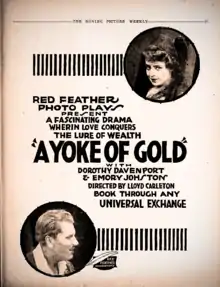 Moving Picture Weekly ad | |
| Directed by | Lloyd B. Carleton |
| Produced by | Universal Red Feather Photoplays |
| Screenplay by | Calder Johnstone |
| Story by | Rob Wagner |
| Starring | |
| Cinematography | Roy H. Klaffki |
| Color process | Black and white |
Production company | |
| Distributed by | Universal |
Release date |
|
Running time | 5 reels |
| Country | United States |
| Language | Silent (English intertitles) |
| Budget | US$3,000 (equivalent to $70,486 in 2019)[1] |
Plot
This melodrama takes place during the Spanish Missions period of California’s history. The film is set between 1834 and 1850. During this period, a massive economic gap existed. While the elite continued to increase their wealth, the poor sunk further in status. The subservient poor were under the “Yoke of Gold,” i.e., the yoke of the aristocracy.
Luis Lopez, acted by Alfred Allen, is smarting under this aristocratic yoke. The fiery Luis wants to become the champion of the poor. Luis fancies himself as a local Robin Hood. Luis claims he wants to rob the rich and redistribute wealth among the poor.
Jose Garcia, played by Emory Johnson, is content to live out his life in the sleepy outskirts of San Gabriel Mission. The gullible Jose falls under the spell of Luis’s fiery rhetoric. Jose also becomes determined to find a way to help the less fortunate. Luis is sensing Jose’s frustration enlists Jose to assist him in pursuing his evil designs. Since they now share common goals, the two become fast friends. Luis and Jose start developing a plan to achieve their aims.
The plan comes together. Jose will rob wealthy landowner Don Ortega portrayed by Frank Whitting. Don Ortega lives in Santa Barbara, California. Luis will rob the wealthy Don Mendoza who resides in “the valley of the seven moons.” After the men have completed both break-ins, they will travel back to San Gabriel. They both swear to distribute all their ill-gotten gains to the poor.
Before Jose departs, he informs his devoted mother and Padre Amador of his plans. Richard Morris plays the role of Padre Amador and leads the Santa Barbara Mission. Since he happens to be San Gabriel visiting friends, the padre gives Jose his blessing. The priest also slips a crucifix into Jose’s backpack for good luck.
Jose has a significant obstacle. Before he can rob Don Ortega, he must first cross a burning desert to reach Santa Barbara. Jose starts a journey under the blistering sun. Soon, overcome with thirst, Jose stops for a drink of water. He discovers he has lost his canteen. Jose starts to search his backpack and finds the crucifix that Padre Amador had concealed. He grabs the cross and throws it into the sand. Jose realizes his fate sealed and lays down in the sand waiting for death.
As luck would have it, another party is traveling behind Jose and headed in the same direction. Castro Arrellanes, performed by Harold Skinner, and his beautiful daughter – Carmen, featuring Dorothy Davenport, are traveling to visit Castro’s cousin. In a bit of irony, Castro’s cousin is none other than Don Ortega. They come across the crucifix half-buried in the sand. Later they discover the half-dead Jose. Jose is on the edge of death. Castro and Carmen decide to finish their journey and take Jose to Don Ortega home to recover. After they arrive at Don Ortega’s home, Carmen starts nursing Jose back to good health.
Now we turn our focus to Luis Lopez. Luis arrived at the home of Don Mendoza in the valley of the seven moons. He convinces Don Mendoza he has lost his way and requests lodging. The Mendozas take him in. After waiting for Mendoza and his wife to fall asleep, Lopez sneaks into the living room. He knows Don Mendoza has hidden bags of gold in a large chest. While stealing the gold, Mendoza’s wife catches him in the act. Lopez attacks the woman, but the ensuing struggle wakes-up Don Mendoza. He rushes to his wife’s aid and forces Lopez to flee. Lopez takes his gold and heads back to San Gabriel to meet up with Jose.
Jose continues to recuperate in Don Ortega’s home under Carmen’s tender care. But during Jose healing process, Jose falls in love with Carmen. Now a man in love, Jose renounces his plans to rob the rich and give to the poor. Recovered, Jose heads back home to confront Luis and tell him of his change of heart.
Jose arrives in San Gabriel. Luis Lopez confronts him. Luis learns Jose had failed in his attempt to rob Ortega. Luis is beside himself with rage. Luis vows to steal Ortega's gold himself. In another starling turn, Jose learns, Lopez never intended to give the gold to the poor. From the start, Lopez had planned to keep all the gold for himself. Jose promises himself; he will not be complicit in robbing those who had befriended him. Before Luis retires for the evening, he stashed the gold he stole from Mendoza under his pillow. Luis falls to sleep. Later in the evening, Jose sneaks into Lopez’s room, takes the gold and escapes into the darkness. Jose then secures a horse and heads for Don Ortega home in Santa Barbara.
Luis discovers what has happened. He vows to pursue the traitorous Jose and kill him. Even though Jose has a head start, Luis believes he can beat Luis to Don Ortega’s home.
Both Jose and Luis ride hard and fast across the desert to Santa Barbara - the home of Don Ortega. Jose wins the race and arrives before Luis. He warns Ortega of the impending robbery, and then both men lay a trap for Lopez. They catch him in the act.
Carmen enters the picture. She believes a caring heart is beneath Luis Lopez’s wicked veneer. Carmen thinks Luis can be redeemed. She pleads with Luis to turn his life around. At Carmen’s bidding, padre Amador has returned to Santa Barbara. He joins Carmen in trying to convince Luis to forsake his sinful life and repent. Suddenly, Luis sees the light, heeds the call and reforms his evil ways. Luis decides to become a monk. He enters the Mission at Santa Barbara under the guidance of Padre Amador. He will spend the rest of his days as a priest at the mission.
Later, Jose and Carmen get married and live in wedded bliss.[4]
Cast
Actor Role Emory Johnson Jose Garcia Alfred Allen Luis Lopez Richard Morris Padre Amador Harold Skinner Castro Arrellanes Dorothy Davenport Carmen, his daughter Frank Whitting Otega Gretchen Lederer
Marketing
Based on an American Film Institute standard, films with a running time of forty-five minutes or longer are considered feature films. In 1915, feature films were becoming more the trend in Hollywood. In 1916, Universal formed a three-tier branding system for their releases. Universal films decided to label their films according to the size of their budget and status. Universal, unlike the top-tier studios, did not own any theaters to market its feature films. By branding their product, Universal gave theater owners and audiences a quick reference guide. Branding would assist theater owners in making a judgment for films they were about to lease and help fans decide which movies they wanted to see.
Universal released three different types of feature motion pictures:[5][6]
- Red feather Photoplays – low-budget feature films
- Bluebird Photoplays – mainstream feature release and more ambitious productions
- Jewel – prestige motion pictures featuring high budgets using prominent actors
This film carried Universal’s “Red Feather” brand, designating a low-budget feature film.
Production
Emory Johnson was 22 years old when he made this movie. Dorothy Davenport was 21 years old.
The film was also known as In The Days of the Missions.[7] The film's name has also been cited as The Yoke of Gold.[8][9]
Searching for a leading man
In early 1916, after Emory Johnson had signed his Universal contract, Carl Laemmle of Universal Film Manufacturing Company thought he saw a potential leading man in Johnson. Laemmle was looking for a leading man comparable to Wally Reid. He was also hoping to create a movie couple that could make sparks fly on the silver screen. Laemmle chose Johnson to be his new leading man. Laemmle chose Dorothy Davenport to generate the screen chemistry with Johnson. She was a Universal contract player who happened to be the wife of Wally Reid. Johnson and Davenport made 14 films together. The series started with the feature production of Doctor Neighbor in May 1916 and ended with another feature production, The Devil's Bondwoman, in November 1916. Over half the films were shorts; almost all were dramas. Johnson and Davenport shared top billing in most. Davenport got pregnant in October 1916, and her film output took a steep nosedive at the beginning of 1917.[10]
In the end, Laemmle thought Johnson did not have the talent or screen presence he wanted. He wasn't going to become Universal's answer to Wally Reid. Laemmle also believed that even though the pairing with Davenport had been financially successful, the films didn't have the screen chemistry he had sought.[11][10]
Title |
Released |
Director |
Davenport role |
Johnson role |
Type |
Time |
LOC |
Brand |
Notes |
|---|---|---|---|---|---|---|---|---|---|
| Doctor Neighbor | May-1 | L. B. Carleton | Hazel Rogers | Hamilton Powers | Drama | Feature | Lost | Red Feather | [12] |
| Her Husband's Faith | May-11 | L. B. Carleton | Mabel Otto | Unknown | Drama | Short | Laemmle | [13] | |
| Heartaches | May-18 | L. B. Carleton | Virginia Payne | S Jackson Hunt | Drama | Short | Lost | Laemmle | [14] |
| Two Mothers | Jun-1 | L. B. Carleton | Violetta Andree | 2nd Husband | Drama | Short | Lost | Laemmle | [15] |
| Her Soul's Song | Jun-15 | L. B. Carleton | Mary Salsbury | Paul Chandos | Drama | Short | Laemmle | [16] | |
| Romance at Random | Jun-18 | Rupert Julian | unk | unk | Comedy | Short | Laemmle | [17] | |
| The Way of the World | Jul-3 | L. B. Carleton | Beatrice Farley | Walter Croyden | Drama | Feature | Lost | Red Feather | [18] |
| Number 16 Martin Place | Jul-13 | L. B. Carleton | Cleo | Jacques Fournier | Drama | Short | Laemmle | [19] | |
| A Yoke of Gold | Aug-14 | L. B. Carleton | Carmen | Jose Garcia | Drama | Feature | Lost | Red Feather | [20] |
| The Unattainable | Sep-4 | L. B. Carleton | Bessie Gale | Robert Goodman | Drama | Feature | 1 of 5 reels | Bluebird | [21] |
| Black Friday | Sep-18 | L. B. Carleton | Elionor Rossitor | Charles Dalton | Drama | Feature | Lost | Red Feather | [22] |
| The Human Gamble | Oct-8 | L. B. Carleton | Flavia Hill | Charles Hill | Drama | Short | Laemmle | [23] | |
| Barriers of Society | Oct-10 | L. B. Carleton | Martha Gorham | Westie Phillips | Drama | Feature | 1 of 5 reels | Red Feather | [24] |
| The Devil's Bondwoman | Nov-11 | L. B. Carleton | Beverly Hope | Mason Van Horton | Drama | Feature | Lost | Red Feather | [25] |
The September issue of the New York Clipper estimated the budget of this film at no more than US$3,000 (equivalent to $70,486 in 2019). They used this figure to explain the poor quality of the feature film. They also pointed out "...the big feature companies are to-day spending from US$5,000 (equivalent to $117,477 in 2019) to US$20,000 (equivalent to $469,908 in 2019) on a five-reeler.[1]
During the shooting of this film, Dorothy Davenport married name was Mrs. Wallace Reid. After her husband's death in 1923, she started to use this name exclusively in the credits for any project she participated.[26]
Release and reception
The film was copyrighted on July 17, 1916, announced in Motion Picture News on July 28, 1916, and officially released on August 14, 1916.[2]
The film opened to mixed reviews.
| Movie Critic Review | ||
|---|---|---|
| In the September 16, 1916 issue of the New York Clipper, the reviewer points out,[1] |
| |
| Movie Critic Review | ||
|---|---|---|
| When Robert C. McElravy of Moving Picture World reviewed this movie, he stated:[8] |
| |
| Movie Critic Review | ||
|---|---|---|
.jpg.webp) |
Peter Milne of Motion Picture News was more upbeat in his review. He observed,[9] |
|
Preservation status
According to the Library of Congress, all known copies of this film are lost.[27]
Gallery
- Stills from the motion picture A Yoke of Gold
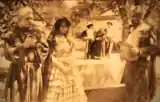 The play has a Mission background.
The play has a Mission background.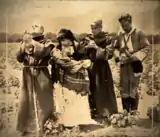 Jose and Carmen receive the Padre's blessing.
Jose and Carmen receive the Padre's blessing. Carmen rests at Santa Barbara.
Carmen rests at Santa Barbara.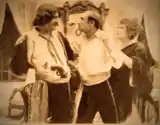 "If you were not my guest . . ."
"If you were not my guest . . ."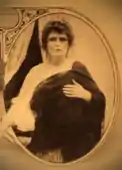 Beautiful Gretchen Lederer
Beautiful Gretchen Lederer Dorothy Davenport, Emory Johnson
Dorothy Davenport, Emory Johnson
References
- "A YOKE OF GOLD". The New York Clipper. September 16, 1916. p. 34.
- "A Yoke of Gold". catalog.afi.com.
- "A Yoke of Gold". www.tcm.com.
- "A Yoke of Gold". The Moving Picture Weekly. New York, The Moving Picture Weekly. August 5, 1916. p. 457.
- Michael Zmuda (April 30, 2015). The Five Sedgwicks: Pioneer Entertainers of Vaudeville, Film and Television. McFarland. pp. 54–. ISBN 978-0-7864-9668-6.
- B movies (Hollywood Golden Age)#Roots of the B movie: 1910s–1920s
- A Yoke of Gold at IMDb
- "The Yoke of Gold" - reviewed by Robert C. McElravy". Moving Picture World. New York, Chalmers Publishing Company. August 5, 1916. p. 87.
- "The Yoke of Gold" - reviewed by Peter Milne". Motion Picture News. Electricity Magazine Corp. August 5, 1916. p. 788.
- E.J. Fleming (July 27, 2010). Wallace Reid: The Life and Death of a Hollywood Idol. McFarland. ISBN 978-0-7864-8266-5.
- "Plays and Players". Exhibitors Herald. Chicago, Exhibitors Herald. June 1, 1918. p. 1050.
- Doctor Neighbor at IMDb
- Her Husband's Faith at IMDb
- Heartaches at IMDb
- Two Mothers at IMDb
- Her Soul's Song at IMDb
- Romance at Random at IMDb
- The Way of the World at IMDb
- Number 16 Martin Place at IMDb
- A Yoke of Gold at IMDb
- The Unattainable at IMDb
- Black Friday at IMDb
- The Human Gamble at IMDb
- Barriers of Society at IMDb
- The Devil's Bondwoman at IMDb
- "Dorothy Davenport". AFI Catalog of Feature Films. American Film Institute. Retrieved April 29, 2019.
- The Library of Congress American Silent Feature Film Survival Catalog: A Yoke Of Gold / Lloyd B Carleton (motion picture)
External links
- A Yoke of Gold at AllMovie
- "A Yoke of Gold". silentera.com.
- A Yoke of Gold at IMDb